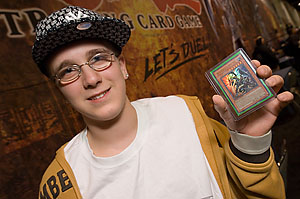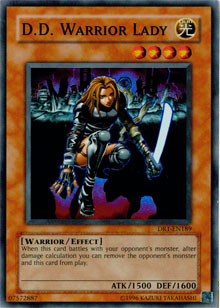
The Yu-Gi-Oh! TCG is a rather defined game. You can see trends in every tournament, on every forum, and everywhere else Yu-Gi-Oh! strategists are to be found. The general consensus is that you win games by removing your opponent's monsters faster than they can remove yours. Once your opponent runs low on options, you start taking their life points down with either big, unstoppable monsters, or little ones your opponent doesn't want to waste monster removal on. Then, one piece of spell or trap removal and a swarm of attacks later, you've got the game in the bag.
This is the way the game has been played for a long, long time. While the pace may change, the general strategy remains the same. The cautious, disciplined players—who carefully manage each card while always staying ahead of the opponent—win tournaments. This was the secret to Team Comic Odyssey's success. They had a large team made up of some of the best players in the game. Their skills, backed up with numbers (the "unlucky stuff can't happen to all of us" theory), took them to the top.
Where are they now? Just because you haven't seen them on Metagame.com recently doesn't mean they've lost their touch. I had the pleasure to watch Matt Laurents and Wilson Luc play at Shonen Jump Championship Chicago and I can tell you firsthand that they're as on top of their game as ever.
But are they playing the right game? In an environment with so many different possible strategies like Yu-Gi-Oh!, the best option is not always the best known or most popular one. Sometimes, a fresh perspective is needed. It's difficult to take everything you know about a card game and put it aside. It's next to impossible to take the accepted rules of strategy and view them in an entirely different light.
Take Team Scoop for example. A relatively unknown team until their success at Shonen Jump Championship Boston last year, Team Scoop took a completely different stance on the game. Their idea of forcing both players into little-to-no monsters and then relying on who top decks better cards seemed absurd. Veterans of the game immediately tossed the results of SJC Boston aside, and agreed that this new philosophy lucked out: that their style of play was still far superior.
Why take your own cards down along with your opponent's? Shouldn't the better player be able to simply stay ahead of the opponent outright? Possibly, but the answer is not always so clear cut. Sometimes, your opponent's cards don't allow you to take control. Sometimes your opponent doesn’t give you the time you need to take control before you’ve lost all your life points.
 Then, with the release of a new ban list, Scoop started dominating. There is a reason that Paul Levitin and Carlos Santiago went on massive Top 8 sprees. A fresh new look on the game combined with some absolutely killer decklists bred a team of winners. Scoop kept on improving their decks until the final masterpiece was presented. It didn't lose a match through the entire tournament, taking home first place. I proudly present to you the turning point of Yu-Gi-Oh! TCG: Paul Levitin's Bazoo/Return.
Then, with the release of a new ban list, Scoop started dominating. There is a reason that Paul Levitin and Carlos Santiago went on massive Top 8 sprees. A fresh new look on the game combined with some absolutely killer decklists bred a team of winners. Scoop kept on improving their decks until the final masterpiece was presented. It didn't lose a match through the entire tournament, taking home first place. I proudly present to you the turning point of Yu-Gi-Oh! TCG: Paul Levitin's Bazoo/Return.
Monsters: 20
3 Bazoo the Soul-Eater
1 Breaker the Magical Warrior
1 Exiled Force
2 Gravekeeper’s Spy
1 Sangan
1 Jinzo
3 D. D. Assailant
1 D. D. Warrior Lady
1 D.D. Survivor
1 Don Zaloog
1 Drillroid
2 Spirit Reaper
2 Cyber Dragon
Spells: 10
3 Smashing Ground
1 Snatch Steal
1 Dark Hole
1 Heavy Storm
1 Premature Burial
1 Mystical Space Typhoon
1 Reinforcement of the Army
1 Nobleman of Crossout
Traps: 10
3 Sakuretsu Armor
1 Widespread Ruin
1 Bottomless Trap Hole
3 Return from the Different Dimension
1 Call Of The Haunted
1 Torrential Tribute
This deck did everything Team Scoop wanted in spades. It forced the game into a state of minimal cards for both players (known as "forced simplicity"), and top decked better than any other deck in the tournament. At the same time, the deck dealt a lot of damage. Forced simplicity becomes even stronger when the opponent is low on life points. If Levitin's opponents had one bad top deck, Paul's next monster usually meant the game was over.
 Levitin's line-up is packed full of monsters that both force simplicity and deal damage. D. D. Assailant and D. D. Warrior Lady take out any monster (along with themselves), to fuel the Removed from Game pile. Sangan and Exiled Force are two other monsters that won't go down without replacing themselves in some way. The rest of Levitin's monster line-up followed the same strategy. Don Zaloog, Spirit Reaper, and D.D. Survivor are good examples of monsters that will either be destroyed before achieving a successful attack, trade with a defensive card, or connect and then be destroyed, trading your monster for whatever they were forced to destroy or discard from hand. These trades also take away a good chunk of your opponent's life points.
Levitin's line-up is packed full of monsters that both force simplicity and deal damage. D. D. Assailant and D. D. Warrior Lady take out any monster (along with themselves), to fuel the Removed from Game pile. Sangan and Exiled Force are two other monsters that won't go down without replacing themselves in some way. The rest of Levitin's monster line-up followed the same strategy. Don Zaloog, Spirit Reaper, and D.D. Survivor are good examples of monsters that will either be destroyed before achieving a successful attack, trade with a defensive card, or connect and then be destroyed, trading your monster for whatever they were forced to destroy or discard from hand. These trades also take away a good chunk of your opponent's life points.
Three copies of Smashing Ground is a perfect fit in this deck. One-for-one trades are what make it shine, and taking out an opponent's monster opens up a free shot at his or her life points. The remaining spells were the staples of the day, and they worked well with the rest of the deck, trading one-for-one with the opponent. Reinforcement of the Army was almost a fourth Smashing Ground, since it searched out the Warriors that cause the trades with the opponent.
The trap line-up continues along the same path. The choices weren't that hard to make, since one-for-one monster removal was all that was really available at the time. However, these simple defensive cards performed perfectly. Three copies of Return from the Different Dimension were the kicker top decks that no one except Team Scoop played in this tournament. They did then exactly what they do now; seal an already won game, or steal a seemingly hopeless one.
For its time, the deck was perfect. Team Scoop has evolved play into what we see now. Forced simplicity as become an excellent strategy, though the mirror match comes down to an extremely draw-based game. However, it’s only a matter of time before the next victorious philosophy emerges.